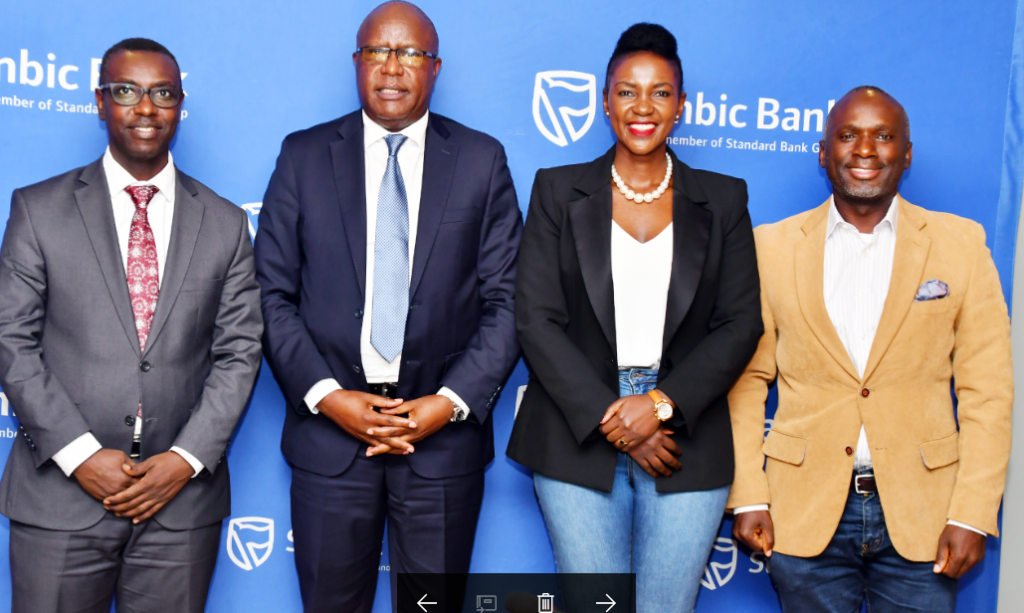
Stanbic Uganda Holdings Limited (SUHL) has announced an interim total dividend payment of UShs 140 billion or UShs 2.73 per share for the half year ending 30 June 2024.
After a meeting held on 15 August 2024, the Board of Directors agreed on the dividend payment subject to regulatory approval by Bank of Uganda.
During the period under review, the SUHL’s profit after tax rose by 17.6 percent to UShs 236bn compared to UShs 200 bn the previous year. Customer deposits also grew by 4.9 percent to UShs 6.6trillion, while customer loans were up 9.5 percent to UShs 4.4tn.
The SUHL subsidiaries are Stanbic Bank, sbg Securities, Stanbic Properties, the Stanbic Business Incubator and Flyhub Uganda Limited which drives digital transformation solutions.
Francis Karuhanga, the SUHL Chief Executive said, “We posted strong results on both the income statement and balance sheet underpinned by our diversified business model, a strong focus on providing innovative solutions to our clients, and effective risk management. The Bank subsidiary continues to be the anchor to our performance, as our beyond-bank subsidiaries gain momentum on their growth trajectory and augment our efforts to deliver on our purpose.”
He said during the period under review, two key elements affected business, namely higher interest rates which affected the quality of assets in the industry and significantly lower demand for private sector credit.
However, Karuhanga said, “Our priority remains ensuring our clients’ needs are appropriately and effectively met. We will continue to focus on strengthening our value propositions by providing solutions that meet our clients’ needs and help them achieve their aspirations.”
In terms of revenues to the government, SUHL paid UShs 181 billion in taxes and collected UShs 4.9 trn on behalf of the Uganda Revenue Authority through the various Stanbic payment channels.
“We are also proud of the investment that we put in society. A total of UShs 1.7 billion has been invested in different communities that we have worked with. We have partnered with a number of SACCOS and village associations to make sure that we can extend banking and financial services to the unbanked. In this respect we have disbursed up to Ushs 127 bn through the SACCOS and village associations,” he said.
According to official data, the beneficiary SACCOS and village associations have over 300,000 members with demographics that cut across all segments of society, women, men and the youth. The impact of these on-lend funds to the SACCOs and VLSAs, amounting to Ushs100bn, has reached 1.2 million people.
Climate change Action
Ms Cathy Adengo, the Head of Sustainability at Stanbic Bank, said the Bank is developing affordable packages and solutions to assist clients to mitigate the effects of climate change.
“Climate change can affect sectors like agriculture. So we are creating the necessary sustainable financial solutions that are going to support organisations in agriculture, including the farmers, because they are the most vulnerable. Our role is providing interventions and affordable funding that will support farmers from the lowest levels, looking at mitigation and adaptation, all the way to supporting larger corporate entities in the value chain,” she said.
However Ms Adengo conceded that more needs to be done on carbon reduction. She said the Bank is taking a technical lead in conducting, together with the Ministry of Finance, Planning and Economic Development, the National Green Tax survey. At completion, this will create criteria for helping financial institutions to make decisions on funding mitigating actions. Meanwhile, Stanbic Bank remains an active corporate partner in Uganda’s reforestation programs.
Efforts for the youth
Karuhanga said SUHL has several products that resonate with the youth, notably FlexiPay, a mobile app which makes it easier to make payments for example movies, at restaurants in a taxi curb among others. FlexiPay is a low-cost payments solution, now with over 900,000 clients and continues to scale in terms of number of transactions and volumes.
“We are so focused on financial inclusion through FlexiPay and Agency banking. About Ushs 14 trillion went through these two platforms. In the fullness of time, FlexiPay will enable us to achieve our objective of driving financial inclusion in Uganda,” Karuhanga said.
The Stanbic Business Incubator has also emerged as an important training hub for many of Uganda’s youthful business startups. The Enterprise Development Programmes on offer are helping to enhance the capabilities of small business owners to become more resilient and run sustainable enterprises.
Karuhanga said, “A number of youths have gone through our incubator programmes and we have seen their businesses grow and some of them are participating in key sectors like the oil and gas. A number of successful people participating in this sector have actually gone through our incubator programmes,” he said.
